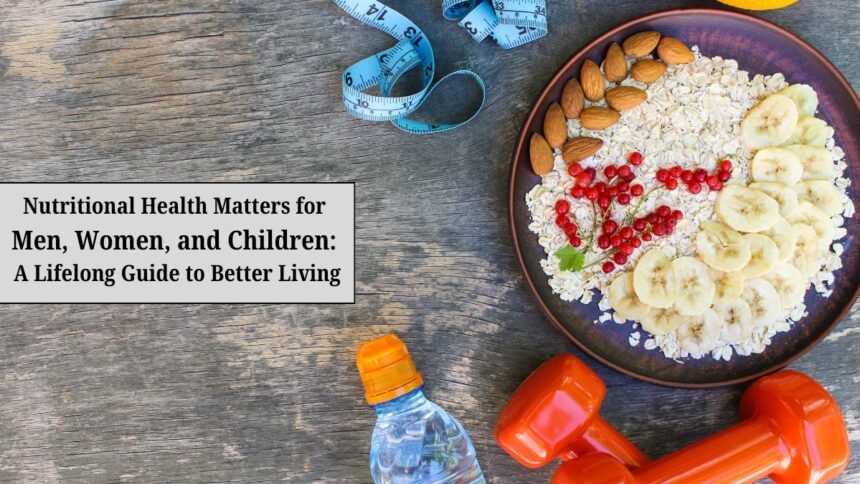Nutritional Health : When it comes to living a healthy and vibrant life, nutrition is one of the most powerful tools we have. Yet, it’s often one of the most overlooked. In today’s fast-paced world, where convenience frequently trumps quality, understanding and prioritizing nutritional health for men, women, and children has never been more critical. From supporting physical growth and mental health to preventing chronic diseases, proper nutrition is the cornerstone of lifelong wellness.
This guide explores the importance of nutritional health across all stages of life, why it differs between men, women, and children, and how families can build better eating habits together.
READ :- The Truth About Carbohydrates : Can You Still Eat Them and Stay Fit?
The Foundations of Nutritional Health
Nutritional health refers to how well our bodies function based on the nutrients we consume. It’s about more than just eating enough food—it’s about eating the right food. This includes macronutrients like carbohydrates, proteins, and fats, as well as micronutrients such as vitamins and minerals.
A balanced diet helps regulate body weight, supports the immune system, boosts energy levels, and promotes healthy organ function. When our bodies receive what they need, we feel better, think clearer, and move more freely.
Unfortunately, the typical Western diet—high in sugar, salt, and processed foods—can undermine nutritional health, contributing to rising rates of obesity, diabetes, and heart disease. That’s why understanding the unique nutritional needs of different groups is so vital.
Nutritional Needs for Men
Men’s nutritional requirements are shaped by factors such as age, metabolism, activity level, and muscle mass. Generally, men require more calories than women due to their larger body size and higher muscle-to-fat ratio. But more calories doesn’t mean eating anything in sight.
Nutritional Focus Areas for Men:
- Protein: Essential for muscle maintenance and repair, especially for those who are active.
- Heart-healthy fats: Omega-3 fatty acids from fish or flaxseed help protect cardiovascular health.
- Fiber: Often under-consumed by men, fiber aids digestion and helps reduce the risk of heart disease.
- Magnesium and zinc: Important for testosterone production, energy metabolism, and immune support.
- Vitamin D and calcium: Crucial for bone health, especially as men age.
Men are also more prone to certain conditions like high blood pressure and heart disease, making a diet rich in fruits, vegetables, whole grains, and lean proteins especially important.
Nutritional Needs for Women
Women’s bodies undergo significant changes throughout life—from menstruation and pregnancy to menopause. These biological shifts mean women often require different nutrients at different times.
Nutritional Focus Areas for Women:
- Iron: Vital during menstruating years to replace blood loss.
- Folic acid: Essential before and during pregnancy to prevent birth defects.
- Calcium and Vitamin D: Women are more prone to osteoporosis, so these are key for bone density.
- Healthy fats: Important for hormonal balance and brain health.
- Antioxidants: Support skin health and help combat aging.
Women should also be mindful of emotional eating triggers and societal pressures that can lead to disordered eating. Eating with intention and balance is key.
Nutritional Needs for Children
Children are in a rapid state of growth and development, so their nutritional needs are different from adults. Providing proper nutrition during these early years can set the stage for lifelong health.
Nutritional Focus Areas for Children:
- Calcium and Vitamin D: For strong bones and teeth.
- Iron: Supports brain development and energy.
- Healthy fats: Crucial for brain growth.
- Protein: Needed for muscle development and immune function.
- Fruits and vegetables: Packed with essential vitamins and fiber.
Encouraging healthy eating habits from a young age helps children develop a positive relationship with food. Limiting sugar, offering a variety of whole foods, and involving kids in meal prep can make a big difference.
Common Challenges to Good Nutrition (and How to Overcome Them)
In modern life, several barriers can make nutritional health difficult to maintain:
- Busy schedules lead to more takeout and processed meals.
- Budget constraints can limit access to fresh, whole foods.
- Confusing information online can make healthy eating feel overwhelming.
- Cultural habits may influence food choices in ways that aren’t always healthy.
Tips for Better Nutrition:
- Plan meals ahead of time.
- Shop with a grocery list and avoid shopping hungry.
- Cook in batches and freeze healthy meals.
- Read food labels and avoid added sugars.
- Stay hydrated with water instead of sugary drinks.
Building a Family-Centered Approach to Nutrition
Good nutrition isn’t just a personal responsibility—it’s a family affair. When the whole family is on board, it becomes easier to stick to healthy habits. Here’s how to cultivate a nutrition-positive household:
- Eat meals together as often as possible to build connection and model good habits.
- Get everyone involved—from grocery shopping to cooking.
- Make healthy swaps (e.g., whole grain pasta instead of white).
- Limit screen time during meals to encourage mindful eating.
- Celebrate small wins like trying a new vegetable or skipping soda for a week.
Nutrition Across the Lifespan
Nutritional needs evolve with age:
- Babies and toddlers need healthy fats and iron for brain development.
- Teens need extra calories and nutrients for growth spurts.
- Adults need to focus on maintenance and disease prevention.
- Seniors need fewer calories but more nutrient-dense foods to maintain strength and immunity.
By adapting diets at each stage, individuals can age more gracefully and remain active longer.
The Role of Education and Awareness
Knowledge is power when it comes to nutrition. Understanding what your body needs—and why—empowers better choices. Schools, healthcare providers, and community programs play a crucial role in spreading awareness about nutritional health.
Nutrition education should be ongoing, not just a one-time lesson. It should be practical, culturally relevant, and adaptable to different lifestyles.
Final Thoughts: A Lifelong Investment in Health
Nutrition is not a one-size-fits-all journey. It’s a dynamic, ever-evolving practice that adapts to the unique needs of men, women, and children. Investing in nutritional health means investing in energy, happiness, disease prevention, and a higher quality of life.
So whether you’re a parent packing lunches, a teenager learning to cook, a man hitting the gym, or a woman navigating menopause—nutrition matters. Start with small, manageable steps and build from there. The food on your plate today shapes the health you live with tomorrow.
Let’s choose better. Let’s live better. One bite at a time.














